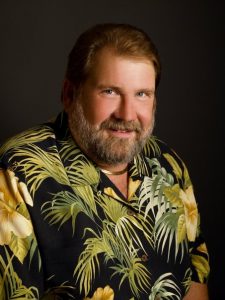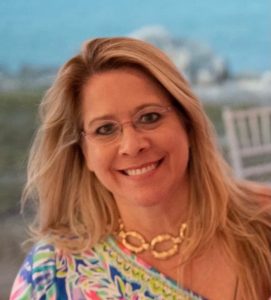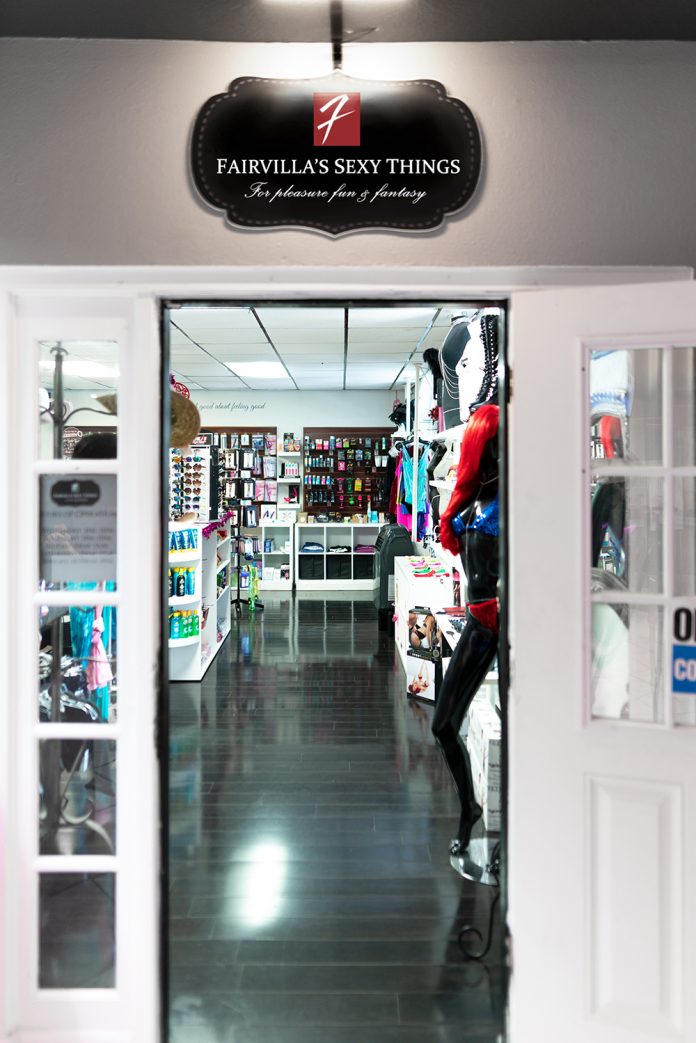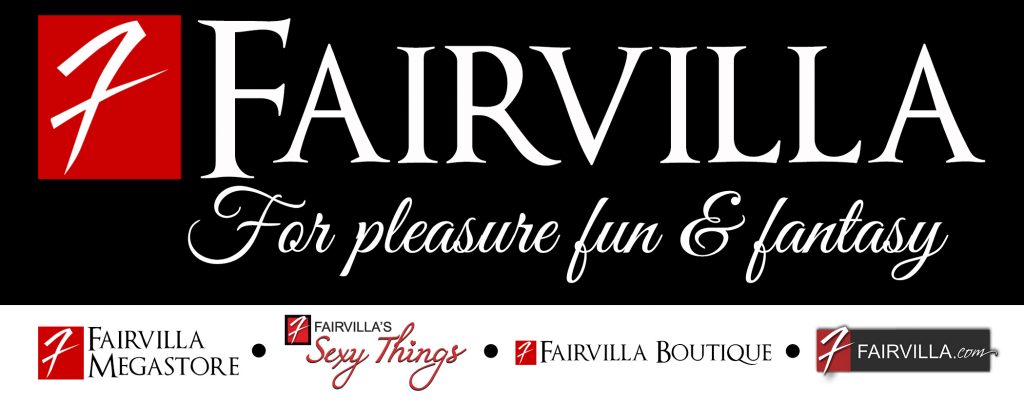(Note: This story appears in the June 2021 issue of Storerotica Magazine)
From the ashes of a twin-cinema has arisen the phoenix of modern, inclusive adult retail, led in large part by Bill and Shari Murphy of Fairvilla fame.
At an AVN trade show, Bill Murphy, who had long operated adult twin-cinemas, saw a graph stating that only 2% of American females had visited an adult establishment.
He decided the other 98% was his market. His distributor, Bill Brady at Southeast Sales, had earlier talked him into putting adult magazines and videos in the twin- cinemas’ lobby. The theaters were only about 800 square feet. They added some toys, and soon the lobby was making more money than the rest of the building.
Murphy and his wife and partner, Shari, pioneered the concept of female and couple-friendly adult retail stores, which led to the dramatic transformation of the adult retail industry from dirty, dingy stores to modern, socially acceptable, friendly stores—places women and couples were eager to patronize.
SE legal correspondent Larry Kaplan talked with the Murphy’s about their transformational impact on the industry.
SE: With the reputation adult stores had when you started, did you get push back from the communities when you opened those first stores?
SHARI: They were very resistant at first. But once they realized that we love our community and want to work with it, they became more receptive. They discovered we wouldn’t be that dirty old bookstore everyone was so used to. It took a while, but they saw what we were doing and were happy with us.
BILL: We also had lots of legal fees, because when they’d take a run at us, we’d sue them back. After a while, they just left us alone.
SE: Tell me about your twin-cinemas and their evolution to a big-box adult video and magazine store and then the first modern female and couples-friendly adult department store?
BILL: After seeing how successful a store could be, we got a contractor to build it out as a larger store to replace the theaters. Now it’s 8,000 square feet. It took us two years to get enough product built up.
SHARI: Bill Brady said he wasn’t big enough to supply us because our building now dwarfed his warehouse.
BILL: We couldn’t afford much inventory. Shari and I would drive to Columbia, South Carolina, to Bill (Brady)’s warehouse on Tuesday, fill up our van Wednesday, get back here on Thursday, process and put the stock back on the shelves Friday, sell it out until Monday, take that money, go back and buy more.
SE: What went into your initial store plan? Did you see what was out there when you started?
SHARI: There were businesses people we know owned where I didn’t feel safe. Sometimes, I brought a bodyguard because I’d be the only female. We were doing our research, looking at different stores, and I felt uncomfortable in all of them.
“We used to hold some of the largest events at the 14,000-square-foot store in the Cape. You get at least 1,400 crazy women inside and outside that store; it was just unbelievable. We had excellent vendor support and incredible excitement and community building from those events. We found they were a little too good, a little too big.” — Shari Murphy
SE: Did you realize what pioneers you were?
SHARI: Everyone said we were crazy. We went to CES just after starting construction. They said you’ll never get women in; there’s no way. Except for Ron Braverman, Susan Colvin, and Larry Garland, who thought it was great. I remember going to Susan at CalExotics, who was consulting us on our opinions on female-friendly packaging. To this day, manufacturers come to our buyers, asking packaging advice.

SE: When did you open your retail first stores, and where were they located?
BILL: Orlando was first in 1991. October will be 30 years as a store and 50 years since I opened as a theater in ‘71. Our second store was in Cocoa Beach in 1996. An adult club lost its liquor license but retained the adult license. I made a deal, and we moved into that 40,000-square-foot white elephant of a building. We did pretty well, but it was just so big with huge overhead.
SE: When did the third store open?
SHARI: In Key West, in 2003. When Bill and I honeymooned in Key West, he asked, where do you see us in 15 years? I said, Well, I’d love to be living in Key West. And we started building the store right before our 15th wedding anniversary, in 2002.
SE: When did the last two stores open?
BILL: In its current format, the International Drive store opened roughly 10 years ago, but the original I Drive store opened 15 years ago. We had a store on Caliente in Tampa, which we closed and now have Sexy Things in Kissimmee.
SE: When the two of you were running Fairvilla, how was the labor divided?
SHARI: Bill handled management, as far as hiring people and advertising. We split purchasing. He did DVDs while VHS was still going around and magazines, and then I had toys, shoes, clothes and lubes, all that stuff.
SE: What were the advantages of have having a chain of stores? Was it about branding or buying power, or other things?
BILL: It was ego. That’s an honest answer.
SE: Tell me about the Fairvilla family—I understand you do tuition refund, among other things?
BILL: Yes, that’s one thing we do. We have a very low turnover rate. We have a lot of people with us for more than 20 years. We offer a 401(k) and affordable health insurance. And despite closing stores during the pandemic, nobody lost a paycheck.

SE: Shari, the early ‘90s was likely an exciting time for a female to be on the front lines, making orders, stocking shelves, attending events/shows. Were you made to feel as welcome in the industry as Bill was back in those days?
SHARI: I felt uncomfortable going into a lot of places. We knew many old-school store owners, we would often meet at their stores and go have dinner, but the stores were just not places I wanted to be in at all. This was before we decided to market to women and make it more comfortable. As Bill said, females were an untapped market. And in many households, the women take care of the checkbook.
SE: Aside from going into other stores, just in terms of meetings and calls with other industry people, were you made to feel as welcome as Bill?
SHARI: Any trade shows we went to and anyone I dealt with, it became like a family reunion. I felt like we were a group of black sheep in an industry that nobody wanted, but then again, everybody wanted it.
SE: Can you two talk about industry relationships?
SHARI: They welcomed me. Once they realize what we were doing, they were like, hey; they’ve got something going. It’s been a very welcoming community.
BILL: It’s sort of like Thanksgiving dinner. You know, you all fight amongst each other, but take care of each other.
SE: You were the first stores in Orlando, I believe, to make it a point to include the local LGBT crowd and other fetishes as pretty standard in your stores, which was unusual, as Orlando was pretty conservative back then. Can you tell me about that?
BILL: You pretty much summed it up. We just always accepted everybody. We didn’t judge you if you wore size white 12 pumps; that’s up to you. Come on in and shop.
SE: Were you like an oasis in the desert for some customers since you were the only ones doing it?
BILL: I don’t know that I can say that. We were just a port in the storm. When they started coming in, people started learning that they were safe and had a knowledgeable staff. Back in the early days, we were the largest magazine retailers in the area. We had transvestites come in with the leather people and the comic book guys, all walks. We had something for everybody.
“It’s sort of like Thanksgiving dinner. You know, you all fight amongst each other, but take care of each other.”
— Bill Murphy on adult industry relationships
SE: Can you tell me about your ladies’ night events?
SHARI: We’ve hosted some epic events. We used to hold some of the largest events at the 14,000-square-foot store in the Cape. You get at least 1,400 crazy women inside and outside that store; it was just unbelievable. We had excellent vendor support and incredible excitement and community building from those events. We found they were a little too good, a little too big. So we started charging admission. It brought the numbers down, making it more manageable. We focused more on education, goodies, freebies, and maybe even seeing a stripper, but you got to learn something, and the vendors continued to be very supportive. That’s where we changed our processes a bit. We could build a massive crowd with the quality of their experience so that they walk away with what we were all about.
BILL: We donated the admission money to local charities. We bought all of the kids’ athletic teams in Cocoa Beach and Cape Canaveral their equipment one year. We donated to a local park and the SPCA. When we changed the store’s location, the Chamber had a ribbon-cutting ceremony.
SE: Can you tell me about your late COO, then-CEO Tom Berger’s influence?
SHARI: He had a great eye for things. He retired from Disney and brought a lot of insight into many things. He was a creative genius and knew how to handle massive crowds.
BILL: He was the smartest man I ever met. He built Disneyland Paris and Tokyo Disneyland. But he started in security there. I remember we were at lunch one day, and he gets a phone call. He said, ‘I have to go back to work. Michael Jackson’s in the park.’ That was a long time ago. He dealt with all the famous people that came there.
SE: What’s your impression of the way the market and the industry has diversified? And on the state of retail today? Let me ask both of you.
BILL: What’s coming up next? I have no idea. I see that there are really nice stores everywhere. Lots and lots of change. Where will it go? I don’t know.
SHARI: As you know, I haven’t worked in the stores in years. But we’re always looking at what’s popular; new trends. I’m always learning new things. We’re doing many more social media contacts and YouTube videos; you’ve got to stay on top of the game. With so many people shopping online, you need to make it an event. So they want to come shop, make it more educational. Online, you’re just looking at a two-dimensional picture. We must make it worth the trip to come to us and feel assured they’re getting a product they’ll enjoy. Because we’re competing with online sales, we need to be smarter, have our employees educated on it, and be prepared to answer customers’ questions or know who can answer them. You must have customer service in the employee education program.
SE: Fairvilla only has five brick-and-mortar locations, yet the chain is universally known as a powerhouse in terms of industry reputation. How do you account for the tremendous reputation Fairvilla has throughout the industry?
SHARI: Once the industry saw what we were doing, everyone jumped on board. They came to us, asking for advice on making their stores friendly to get women in. When they came and visited our store, they were so impressed. They couldn’t believe how pretty and well-lit it was and that we had displays up. Everyone else in the old days had dirty stores with stuff up on the walls.
BILL: The last box of pegboard we bought was put in the warehouse years ago; we never used it.
Larry Kaplan has been the Legal Correspondent for ED Publications for 21 years. Mr. Kaplan is a broker in the sale and purchase of adult retail stores and adult nightclubs and the Executive Director of the ACE of Michigan adult nightclub state trade association. Contact Larry Kaplan at 313-815-3311 or e-mail larry@kaplanstoresales.com.
















You must be logged in to post a comment.